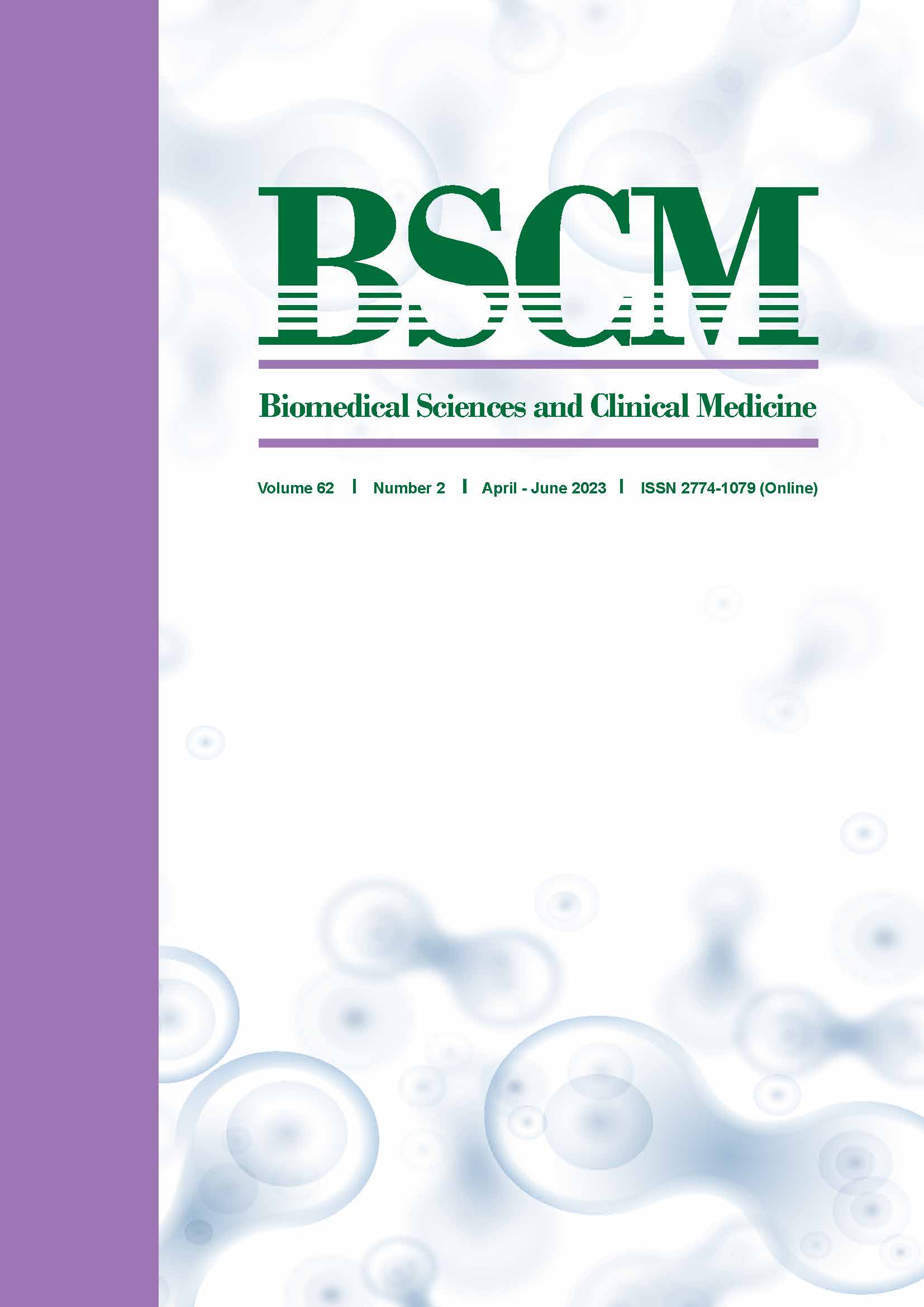An Evaluation of Nurse Anesthetists’ Acquisition and Retention of Knowledge and Skill Performance for Brief Basic Life Support and Advanced Cardiac Life Support Training
Keywords:
knowledge and skills retention, nurse anesthetists, acqui- sition, basic life support, advanced cardiac life supportAbstract
Objective The purpose of this study was to evaluate the acquisition and retention of knowledge and skills of basic (BLS) and advanced cardiac life support (ACLS) for nurse anesthetists at Maharaj Nakorn Chiang Mai Hospital.
Methods The one-group pretest-posttest design study was used. BLS and ACLS training comprised a brief BLS and ACLS review and practice. Knowledge was assessed by multiple-choice questions. The BLS skills were assessed by observing CPR performance on a Resusci- Anne-skill meter manikin and ACLS skills were evaluated using ACLS scenarios. The knowledge and skills were assessed before and after the training weekly for four weeks, and then at three months after the training ended.
Results A total of 38 nurse anesthetists participated in the study. There were significant increases in BLS and ACLS knowledge and skills after the training. However, there was short retention of BLS and ACLS knowledge and skills at three months after the training. Foreign body airway obstruction and assessing unresponsiveness were the two most common of BLS skills degradation. While the primary and secondary assessment, assessing ACLS algorithms, electrocardiogram recognition and electrical therapy were the common skills performance of ACLS skills degradation.
Conclusions After the BLS and ACLS training, the knowledge and skills were significantly improved but there was short retention of knowledge and skills at three months after the training. Regular refreshment of CPR education is recommended to enhance the retention of knowledge and practice of nurse anesthetists.
References
Jacobs I, Nadkarni V, Bahr J, Berg RA, Billi JE, Bossert L, et al. Cardiac arrest and cardiopulmonary resuscitation outcome reports: update and simplification of the Utstein templates for resuscitation registries. A statement for healthcare professionals from a task force of the international liaison committee on resuscitation. Resuscitation. 2004;63:233-49.
Nadkarni VM, Largin GL, Peberdy MA, Carey SM, Kaye W, Mancini ME, et al. First documented rhythm and clinical outcome from in-hospital cardiac arrest among children and adults. JAMA. 2006;295:50-7.
An JX, Zhang LM, Sullivan EA, Guo QL, Williams JP. Intraoperative cardiac arrest during anesthesia: a retrospective study of 218,274 anesthetics undergoing non-cardiac surgery. Chin Med J. 2011;124:227-32.
Charuluxananan S, Sriraj W, Punjasawadwong Y, Pitimana-aree S, Lekprasert V, Werawatganon T, et al. Perioperative and Anesthetic Adverse events in Thailand (PAAd Thai) incident reporting study: anesthetic profiles and outcomes. Asian Biomedicine. 2017;11:21-32.
Siriphuwanu V, Punjasawadwong Y, Lapisatepun W, Charuluxananan S, Uerpairojkit K. Incidence of and factors associated with perioperative cardiac arrest within 24 hours of anesthesia for emergency surgery. Risk Management and Healthcare Policy. 2014;7:155-62.
Pipanmekaporn T, Bunchungmonkol N, Chuaratanaphong S, Punjasawadwong Y, Saringcarinkul A, Sawaddiruk P. Perioperative mortality and risk factor in cardiac surgery a review of 3,822 cases at the northern cardiac center Thailand. Chiang Mai Medical Journal. 2009;48:15-24.
Tamdee D, Churuluxananan S, Punjasawadwong Y, Tawichasri C, Kyokong O, Patumanond J, et al. Factors related to 24-hour perioperative cardiac arrest in geriatric patients in a Thai university hospital. J Med Assoc Thai. 2009;92:198-207.
Siriphuwanun V, Punjasawadwong Y, Lapisatepun W, Charuluxananan S, Uerpairojkit K, patumanond J. The initial success rate of cardiopulmonary resuscitation and its associated factors in patients with cardiac arrest within 24 hours after anesthesia for an emergency surgery. Risk Management Healthcare Policy. 2014;7:65-76.
Moretti MA, Cesar LAM, Nusbacher A, Kern KB, Timerman J, Ramires AF. Advanced cardiac life support training improves long-term survival from in-hospital cardiac arrest. Resuscitation. 2007;72:458-65.
Hamilton R. Nurses’s knowledge and skill retention following cardiopulmonary resuscitation training; a review of the literature. Journal of Advance Nursing. 2005;51:288-97.
Madden C. Undergraduate nursing students’ acquisition and retention of CPR knowledge and skills. Nurse Educ Today. 2006;26:218-27.
Partiprajak S, Thongpo P. Retention of basic life support knowledge, self-efficacy and chest compression performance in Thai undergraduate nursing students. Nurse Educ Pract. 2015;16:235-41.
Boonmak P, Boonmak S, Srichaipanha S, Poomsawat S. Knowledge and skill after brief ACLS training. J Med Assoc Thai. 2004; 87:1311-4.
Stross JK. Maintaining competency in advanced cardiac life support skills. JAMA. 1983;249(24): 3339-41.
Kaye W, Mancini ME, Rallis SF. Advanced cardiac life support refresher course using standardized objective-based Mega Code testing. Crit Care Med. 1987;15:55-60.
Cowie DA, Story DA. Knowledge of cardiopulmonary resuscitation protocols and level of anaesthetic training. Anaesth Intensive Care. 2000;28: 687-91.
Noordergraaf GJ, Be WK, Sabbe M, Diets RF, Noordergraaf A, Van Hemelrijck J. Training needs and qualifications of anaesthesiologists not exposed to ALS. Resuscitation. 1999;40:147-60.
Smith KK, Gilcreast D, Pierce K. Evaluation of staff’s retention of ACLS and BLS skills. Resuscitation. 2008;78:59-65.
Munezero JBT, Atuhaire C, Groves S, Cumber SN. Assessment of nurses knowledge and skills following cardiopulmonary resuscitation training at Mbarara Regional Referral Hospital, Uganda. Pan Afr Med J. 2018;30:1-14.
Broomfield R. A quasi-experimental research to investigate the retention of basic cardiopulmonary resuscitation skills and knowledge by qualified nurses following a course in professional development. J Adv Nurs. 1996;23:1016-23.
Cooper S, Libby J. A review of educational issues in resuscitation training. J Clin Nurs. 1997;6:5-10.
Nyman J, Sihvonen M. Cardiopulmonary resuscitation skills in nurses and nursing students. Resuscitation. 2000;47:179-84.
Pareek M, Parmar V, Badheka J, Lodh N. Study of the impact of training of registered nurses in cardiopulmonary resuscitation in a tertiary care centre on patient mortality. Indian J Anaesth. 2018; 62:381-4.











